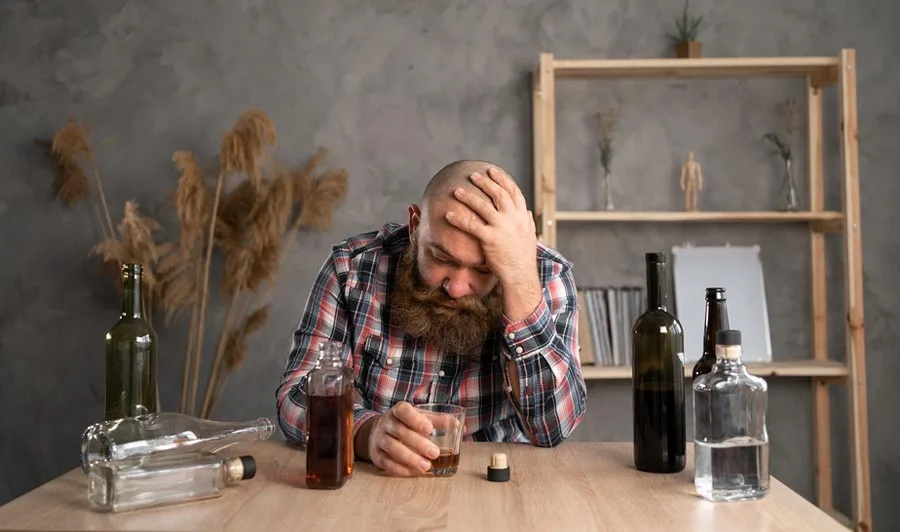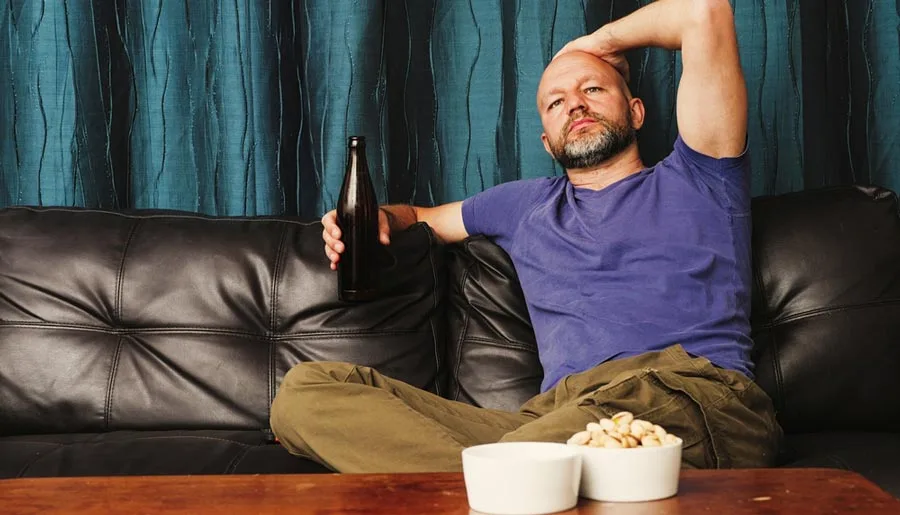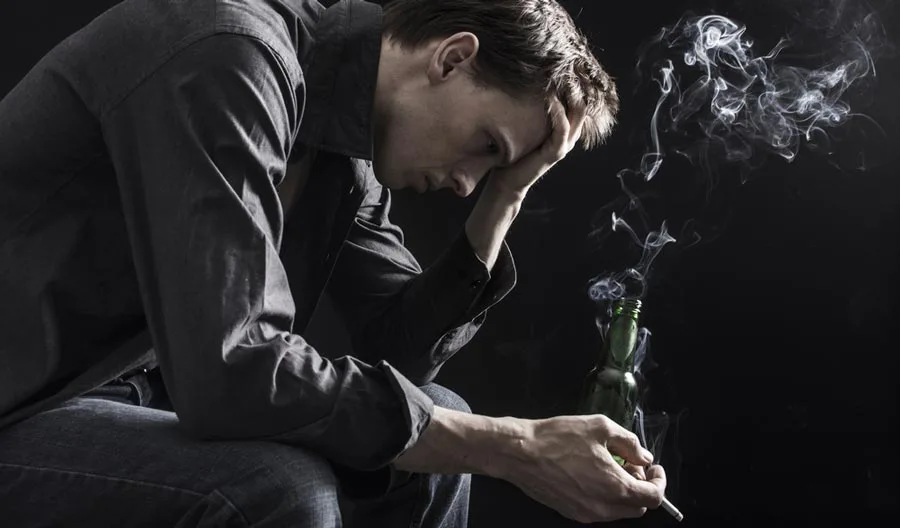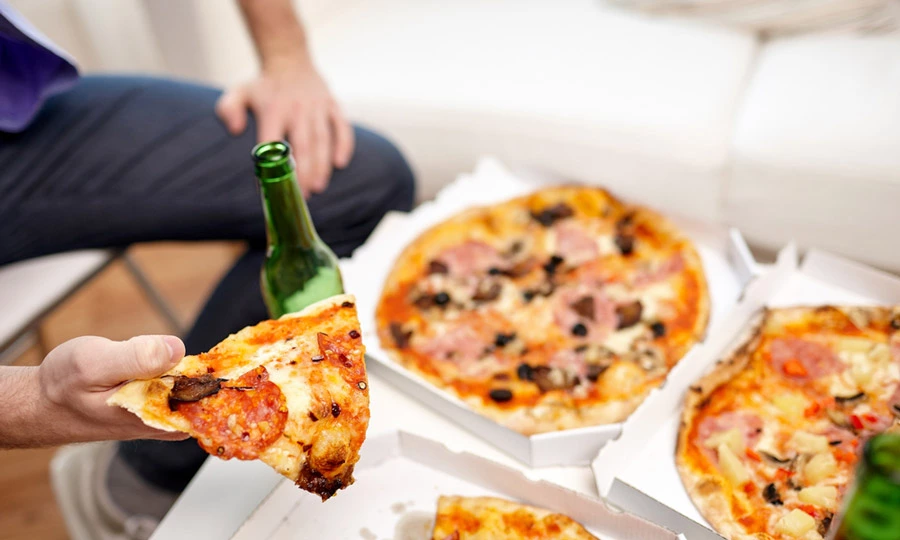Does Alcohol Cause Hair Loss?

Alcohol and Hair Loss: Is There a Connection?
Most men are poised to experience some form of balding or hair loss as they approach a certain age. For some, it happens as early as their 20s – others are fortunate enough to maintain their locks until they age well past 40 and into their 50s. But does alcohol cause hair loss directly?
For a select group of men, the amount of hair loss is directly correlated with their alcohol consumption. It sounds like something you would hear as a rumor or old wives’ tale – but unfortunately, there is a connection between drinking alcohol and hair loss.
In this article, we’ll dive into just how much of a connection exists and if there’s anything you can do about alcohol-related hair loss. If you have a habit of drinking alcohol and are experiencing hair thinning or a lack of hair growth, you might want to read this until the end.
Drinking Alcohol and Hair Loss
Excessive drinking can contribute to the decline of hair health and an increase in hair loss. Although it’s not always the cause of the issue, drinking alcohol can have various effects on the body. One of these is the impact on the skin – more specifically, the scalp. A healthy scalp equals healthy hair, so an unhealthy scalp equals – not-so-healthy hair.
It’s widely known that alcohol can have detrimental effects on your health, including your liver, heart, and skin. This isn’t exactly a well-kept secret. However, what does it do to your healthy hair? You might want to avoid excess alcohol consumption, especially if you want to dodge thinning hair.
A study conducted in 2013 revealed some interesting data regarding alcohol consumption and hair loss.
Addiction Treatment that
Just Works
Individualized treatment programs delivered in a comfortable, relaxed setting promote healing in your recovery journey.
Evidence Related to Hair Follicle Loss and Alcohol
The results of the study revealed that higher alcohol consumption was associated with an increased likelihood of experiencing temporal hair loss. Other negative effects of drinking too much include dry skin, malnutrition, and even an increase in estrogen levels!
We all know that if you don’t give some attention to hair health, it can break and fall out. If your hair isn’t rich in nutrients, breakage and hair loss is the result. Well what happens when your diet isn’t nutrient-rich? It’s the same result for hair growth.
Drinking alcohol can also lead to hair loss. In severe cases, it can cause the hair follicles to dry out, which leads to hair follicles and roots becoming weak. This condition leads to widespread hair loss because the base, or root, of the hair, isn’t supported. When this happens, there’s no way to experience healthy hair growth.
This hair loss isn’t just a random occurrence. There are actually specific nutrients and other effects that are known to specifically cause stunted hair growth and negative hair health. Let’s dive in a little further.
How Does Alcohol Slow Hair Growth or Damage Hair Health?

Alcohol consumption has a direct effect on maintaining a balanced diet and our body absorbing vital nutrients we need for things like hair growth. In this section, we break down exactly what nutritional deficiencies are caused by excessive alcohol consumption and how these lead to hair loss and damaged hair follicles.
Protein and Alcohol Related Hair Loss
Protein is the cornerstone of any nutritious diet, right? It’s definitely a cornerstone for avoiding hair loss.
Alcohol severely affects the way our body absorbs protein. The effects can be quite noticeable. Some of the potential results include hair loss, brittle nails, and flaky skin. This causes not only direct hair loss but breakage from the hair follicles.
The amount of protein you should take in daily is directly influenced by your body weight. In addition, if you’re a lightweight but consume excessive alcohol, the damage can be multiplied exponentially.
If you’re underweight, you definitely should avoid excessive drinking.
Does Iron Influence Hair Loss?
Iron has a direct relationship with alcohol and hair loss. Studies conducted on pregnant women with iron deficiencies proved beyond conclusively that a lack of iron leads to hair loss – as pregnant women with this issue commonly experience thinning hair. This led to more studies regarding alcohol and hair loss.
Alcohol can have a direct effect on the amount of iron-rich foods that people include in their daily intake. This dynamic, albeit indirect, is another example of how excessive alcohol leads to hair loss.
Important Metals and Hair Loss
Zinc and copper also play a vital role when it comes to a balanced diet. A study in 2013 revealed that people with telogen effluvium, alopecia areata, and male pattern baldness, all forms of hair loss, experienced these conditions because of zinc deficiency. Low copper levels also played a role in this dynamic.
Excessive Alcohol Combined with Cigarette Smoke

You might want to think twice before you have a cigarette with your next beer or glass of wine. Plenty of people drink and smoke socially. Well, this action leads to a large number of negative skin conditions. The chemicals in cigarettes can affect the hair and skin, narrow blood vessels, and prevent the skin from receiving the nutrients and oxygen it needs.
It also promotes cancer, delays the healing process of wounds, and increases the risk of developing skin conditions like psoriasis. There are thousands of chemicals in tobacco smoke that can damage collagen and other skin cells, causing premature aging and sagging skin. There have also been studies demonstrating a link between smoking and hair loss.
Subsequent studies proved a link between drinking, smoking, and hair loss.
Thyroid Conditions, Alcohol and Hair Loss
Drinking too much alcohol can affect your body’s ability to detect and respond to certain hormones. This effect on the hormones causes problems with the way the body sheds and grows hair.
These hormone issues are also known to cause hyperthyroidism and prolonged hypothyroidism. Both of these conditions are linked to hair loss – more nutritional deficiencies linked to too much alcohol.
This can happen in a short span of time or over a long period of time. According to experts, it’s not the hyperthyroidism and hyperthyroidism that’s directly linked to hair loss – but instead a link between thyroid disorders and alcohol withdrawal that leads to hair loss.
Excessive Alcohol Consumption and Lack of Sleep
Sometimes it feels like a “stiff one” before bed might help you get better rest. However, it has the exact opposite effect, leading to diminished sleep quality. This can cause you to become irritable and tired – causing a natural increase in stress levels. It’s widely noted that stress can have a significant impact on hair loss.
High levels of stress can stimulate neurogenic inflammation, which is a detrimental condition for those with age-related hair loss. It can also cause a cytokine imbalance, which could lead to further inflammation. It’s also linked to a low oxygen supply – another cause of unhealthy hair.
Stress and sleep quality are actually two of the biggest factors when it comes to the health of your hair and scalp. Excessive alcohol consumption has a negative effect on both, directly obstructing healthy hair growth.
Addiction Treatment that
Just Works
Individualized treatment programs delivered in a comfortable, relaxed setting promote healing in your recovery journey.
Your Hair Growth Cycle and Your Liver/Blood Sugar Spikes
Heavy drinkers are candidates for liver damage. The liver does an important job of removing toxins from the body, acting as a purification system for the blood. Short-term alcohol abuse can have a significant impact on your liver function.
When alcohol metabolizes, the result is the creation of harmful by-products that damage the liver, leaving a lasting impact even on those who rarely engage in alcohol use. Dehydration is caused by alcohol use, which also makes the liver work harder, affecting your overall health and normal hair growth.
When water concentrations are low during dehydration, toxins created exist in larger concentrations. Inflammation also takes place, leading to hair shedding.
Alcohol is known to cause blood sugar spikes – most versions of alcohol are fermented food combined with sugar. A poor diet and spikes in blood sugar are the primary culprits of damage to hair.
Folic Acid, Your Hair, and Alcohol Use
Folate deficiency is a condition that causes a drop in red blood cell production. It can be treated by consuming folic acid, which is a synthetic vitamin. Men with age-related baldness are more prone to experiencing folate deficiency.
Alcohol has a drastic effect on the absorption of folic acid. In addition, it can increase the excretion of this nutrient through urine. What does it do to hair growth when it comes to the production of healthy and vibrant hair? The healthy blood flow and overall supply to the root are affected in a negative way.
Without adequate levels of folic acid, the body reduces the nutrients and oxygen that are delivered to the hair follicles. This will damage hair follicles.
Overall Decline In Diet Choices

We all know that alcohol lowers your inhibitions. Well, how many times have you seen someone drunk or tipsy either irresponsibly order food from a fast food restaurant or barge in the house and start cramming the unhealthiest foods possible? Their taste buds are altered so they believe the food tastes better than it actually does, and people who normally wouldn’t eat junk food will lower their standards and partake in a fast food burger, junk food, candy, or other foods that are detrimental to your diet.
It might not be a big deal if it happens once or twice. Maybe you’ve even done it yourself.
But when alcohol addiction kicks in, what do you think happens to your eating habits overall? Do you think you might stray away from cooking healthy meals nightly and lean more toward eating junk food and Mcdonald’s? There’s a distinct possibility of the latter taking place.
This is the standard routine of so many alcoholics – come home, eat a terribly unhealthy meal, drink more, and pass out with a buzz – obtaining bad sleep after a bad dinner. You can see how this can not only play a significant role in the loss of your hair, but the overall nutritional deficiency caused by such behavior can do some pretty nasty things to your body in general.
The question is – for those who engage, or have engaged in this type of behavior – what can you do to reverse the damage? Is it too late – or is there hope on the horizon?
How to Counteract Bad Diet Choices and Hair Loss from Drinking
One of the most effective ways to prevent hair loss caused by alcohol is to stop drinking altogether. This can be done by those who binge drink, as well as those who drink consistently day in and day out.
However, for those who do not have a drinking problem, it still wouldn’t hurt to reduce your intake. If you have a couple of drinks weekly and drink on the weekends, reduce your consumption to a couple of beers on the weekend.
If you believe that alcohol consumption has caused hair loss, then cut out your drinking completely.
The Importance of Nutrition for Hair Health
After stopping, it’s important to maintain a healthy and balanced diet. A blood test can give you an idea of the elements you lack nutritionally. This helps you boost the vitamins and minerals you need to enhance your hair growth.
Having a better understanding of the nutrients that you need to increase is easily accomplished by changing your diet or consuming supplements.
Although taking a supplement can help maintain a healthy and balanced level, it’s not the best way to get the nutrients that you need in the long run. In order to ensure that the nutrients are absorbed properly, it’s best to get what you can from foods, and take supplements to complement your diet. Don’t rely solely on synthetic vitamins and all-in-one solutions.
Supplements and Vitamins to Help Counter Hair Loss
A lack of Vitamin D is actually a huge culprit when it comes to nutrient deficiencies. Although taking a supplement can help, pharmaceutical solutions might not be the best course of action.
Vitamin D needs fat to fully absorb. When you consume anything rich in Vitamin D, use an Omega 3 supplement or food rich in Omega 3 to increase your absorption. You can also consider other nutrient pairings such as stacks including vitamin B12, vitamin D, and calcium.
Copper, potassium, and zinc can also be extremely powerful. If you’re planning on making a long-term commitment to improving your health, then it’s important that you focus on a diet change. This puts you into the habit of getting healthy and staying healthy and not relying on a miracle solution.
Some diets may be very restrictive, while others may be completely lacking in certain food groups.
A diet rich in lean protein, leafy greens, whole grains, and healthy fats is a great source of nutrients. This helps you maintain healthy hair growth and satisfies your daily caloric intake demands.
Combat Alcohol Use and Improve Your Health Now
At Resurgence Texas, we provide a robust program for alcohol abuse. In addition, we also have a nutritional program that provides you with the elements you need in your diet every day.
For more information about any of our programs, nutritional plans, and admissions, contact a member of our staff today!
Addiction Treatment that
Just Works
Individualized treatment programs delivered in a comfortable, relaxed setting promote healing in your recovery journey.
